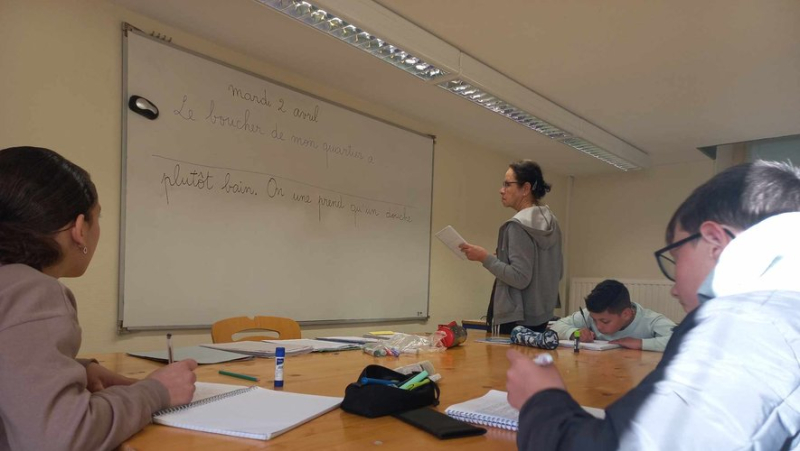In Béziers, the crusade of the Henri-IV college against illiteracy

Une petite salle, un petit groupe… De bonnes conditions pour réapprendre à lire. – F.Faux
Sans lecture, pas d’avenir. Une institutrice à la retraite remet à niveau des collégiens qui sont sortis du primaire… sans savoir lire. Un dispositif qui devrait être étendu à la rentrée prochaine à six établissements biterrois.
There are three children around a table, with the teacher, Kheira Moussouni, at the table. "Rémi goes to the square, she reads… You understand ?". "What is a squart ?"< /em>, asks Medhi, raising her finger. "A square, not a square. It’is a garden with games. If you pronounce it correctly, you will understand better. The heads dive back towards the notebooks. Boris and Lamia decipher the rest of the text, which they follow with their pen, a little whisper between their lips.
This banal scene plays out every day in thousands of primary schools. But in a college, it is more unusual. For the second year in a row, middle school students from Henri-IV, in Béziers, especially from the 6th and 5th grades, are taken care of four hours a week by a retired school teacher… to learn to read. "It’is an experimental device for those we call non-readers, explains Karine Sabah, the deputy principal. We are almost the only ones to offer it in the academy."
The eight students benefiting from the system were identified thanks to national assessments for entry into 6th grade. They include a fluency test to measure reading speed, which should be 120 words per minute at the end of CM2. For Kheira Moussouni, this is a point of departure:"Lamia, for example, went from 17 to 104 words in a year and a half… It’s a big job. But then you have to understand what you are reading. This is why we also work on vocabulary, the association between words and images, diction."
"Disinvested parents"
The class continues, with other readings, blank sentences to complete. Kheira, who trained entire generations of kids, notably at the ;school of Maraussan, knows his work. Illiteracy, she even experienced it in her flesh, with Algerian parents who did not know how to read, administrative documents to fill out for them…hellip; "Over there, you only have a dusty textbook for a whole class, but when I see the resources that there are in France, and these middle school students who arrive without knowing how to read, I find it distressing."
Without tongue in cheek, she is not content to denounce the omnipresent screens: "There are some primary school teachers, not conscientious enough, and also certain parents who have had a complicated relationship with school, and who are completely disinvested in the education of their children." The same people also forget to send their offspring to reading time, the hunt for absenteeism has become another of its priorities.
The experience of Henri-IV, however, is conclusive. Its promoters will be in Toulouse this Friday to present it, and it should be extended at the start of the school year to six establishments in Béziers.
The hour ends. The children take their coats to return to their class. "Usually, we end with a game, but hey, that will be for next time", reassures Kheira. Do her students understand that mastering reading can change their lives ? Lamia and Medhi agree. Boris, for his part, is more circumspect: "We can succeed in life, he says boldly, even if we don't know how to read.
Obtain budgets
Apart from its hours allocated by the ministry, a school does not have the budget to pay temporary workers. To do this, you must respond to calls for projects. This is what the Béziers town hall did, which obtained 400,000 euros for the Educational City, a national program which concerns the training of young people aged 0 to 25.
This sum makes it possible to finance several training courses, such as these reading courses, class visits to bookstores, additional hours of French for those who need it, interventions for students and students. authors. Without forgetting the quarter of an hour reading, during which students and teachers read a book together in silence… A real luxury in the age of omnipresent social networks.




